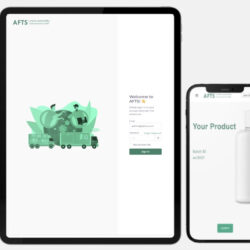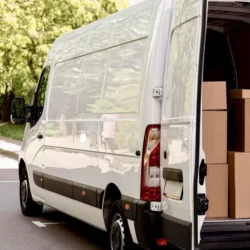Start-up CarbonLeap pioneers carbon insetting

Companies need to reduce their carbon emissions, but what if these emissions are caused elsewhere in the chain? Now they can still achieve their sustainability goals thanks to carbon insetting. The Dutch company CarbonLeap can help. ‘With a carbon claim, you achieve sustainability at an efficient price, without having to turn your whole supply chain around.’
CarbonLeap’s founders already had experience in deploying biofuels in maritime and road transport. They are now using this knowledge to realize CO2 reductions in supply chains, thereby producing tradable carbon claims. Companies can use these claims to boost CO2 reductions in their ESG reports.
This principle of CO2 reduction in an indirect or similar supply chain is called ‘carbon insetting’, as a counterpart to ‘carbon offsetting’, where you offset emissions such as by creating forested areas, for example. According to the Amsterdam start-up, using biofuels gives a direct and well-defined reduction in emissions, while ‘storing’ CO2 in trees, for example, has a much less certain impact.
Impact on sea transport
European companies are obliged to reduce their harmful emissions and eventually to achieve net zero. ‘Most companies are busy working on this, but run into the problem that a large part of their CO2 emissions are caused elsewhere in the chain, such as at external transport companies,’ explains CarbonLeap CFO Wildrik de Blank.
‘Companies bring goods to Europe from distant ports via sea transport. Shipping companies run those sea vessels and emit a lot of CO2. Individual companies have little influence on this, and an alternative transport method quickly becomes very costly. With a CO2 reduction claim for transport, you realize a CO2 reduction at an efficient price without having to change your entire supply chain straight away.’
Scalable CO2 reduction
Purchasing a carbon reduction claim based on a sustainability project in an indirect or similar supply chain may sound cumbersome, but De Blank says it is actually an elegant and scalable way to achieve reduction targets faster as an industry.
‘It is far more practical for companies to invest in claims than to deal with transport partners themselves. It also makes shippers more willing to invest, while the transport companies we invest in also benefit. If we help a shipping company make the switch from fuel oil to biofuel, we compensate them in costs.’
€2 million raised
CarbonLeap was founded in 2020 by sustainability experts Bertil Duinhouwer and Guido Levie. The Amsterdam-based company now employs eight people. Last year was the first official year, but a ‘fuel switch’ has already been implemented at several transport companies, thus reducing the Scope 3 emissions for customers. Those activities went well and attracted attention from investors, who have invested €2 million into the start-up.










